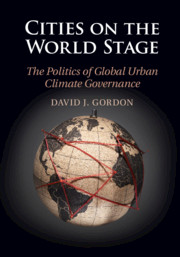Book contents
- Cities on the World Stage
- Cities on the World Stage
- Copyright page
- Contents
- Figures
- Tables
- Acknowledgments
- Abbreviations
- Introduction
- 1 The Contours of Coordination in the C40
- 2 A Theory of Global Urban Governance Fields
- 3 The Contours of Convergence in the C40
- 4 Act I
- 5 Act II
- 6 Act III
- Conclusion
- Book part
- References
- Index
2 - A Theory of Global Urban Governance Fields
Published online by Cambridge University Press: 16 April 2020
- Cities on the World Stage
- Cities on the World Stage
- Copyright page
- Contents
- Figures
- Tables
- Acknowledgments
- Abbreviations
- Introduction
- 1 The Contours of Coordination in the C40
- 2 A Theory of Global Urban Governance Fields
- 3 The Contours of Convergence in the C40
- 4 Act I
- 5 Act II
- 6 Act III
- Conclusion
- Book part
- References
- Index
Summary
While voluntary city-networks lack formal mechanisms of coercion, they remain subject to complex political and power relations that shape their capacity to produce collective efforts. This chapter develops a general theory of global urban governance fields that brings to light the ways in which power is present in city-networks like the C40. The chapter starts from the premise that coordination in these networks requires convergence around a shared sense of what it means to “be” a global urban climate governor. While multiple actors – not only cities but also private corporations, philanthropic foundations, civil society organizations, and international organizations - seek to shape the content of field norms, practices, and collective identity, in newly created governance fields the authority to do so is contested. Actors make particular claims to authority, based on material resources, expertise, reputation, and institutional position, but only through the mechanism of recognition are these acknowledged as authoritative. The ability to secure recognition for the members of the governance field enables those actors to secure deference to particular terms of recognition (the governance norms, practices), shaping how governance is understood and practiced by those within the field.
Keywords
- Type
- Chapter
- Information
- Cities on the World StageThe Politics of Global Urban Climate Governance, pp. 56 - 83Publisher: Cambridge University PressPrint publication year: 2020



